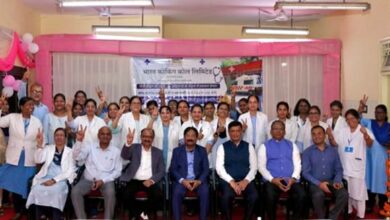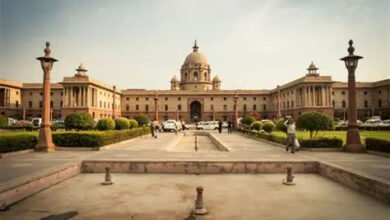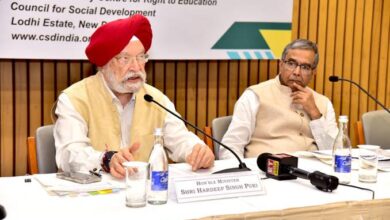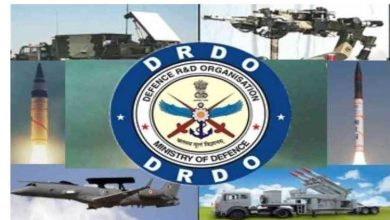India Continues To Attract Worlds’ Interest At Davos
India showcased growing prowess in manufacturing, AI, sustainable development, tech startups

The Indian delegation continued its impressive showcase of the India opportunity to global investors at the World Economic Forum (WEF) Annual Meeting at Davos. The delegation highlighted India’s efforts to boost manufacturing, creation of public infrastructure, and sustainable development. The Indian delegation discussed important themes such as the potential of semiconductor manufacturing in India, the rise of technology-led new age entrepreneurship in India, and Gender Impact Investing in India as a catalyst for driving the next wave of growth.
India’s array of four impressive and distinct centres – India Engagement Centre, Experience India Centre, India Investment Centre and We Lead Lounge, at WEF, continue to attract attention, and showcase its vibrant and resilient economy.
Smt. Smriti Irani, Hon’ble Minister of Women & Child Development participated in multiple WEF sessions and panel discussions on digital public infrastructure and India’s impact on global technology value chains, gender impact investing and measuring the contribution of women to the economy. “In the age of digital democracy, India has emerged as a torchbearer for transformative innovation. The country’s e-governance ecosystem is unparalleled, especially at the pace and scale of rollout,” Smt. Irani said. “Platforms like MyGov invite citizens to engage digitally and actively contribute to shaping policy. The budget will reflect these inputs from our diverse populace. India is a stage for the world’s largest democratic elections with 945 million eligible voters, 94% biometrically authorised and an impressive 70% actively participating. We leverage electronic systems and social media to better inform our citizens,” Smt. Irani added.
Smt. Irani held meetings with the leadership of Uber, and the Federal Minister of the European Union, among others.
Shri Hardeep Singh Puri, Hon’ble Minister of Petroleum & Natural Gas, Housing & Urban Affairs, met leaders from energy corporations such as SOCAR, Shell, Equinor, Honeywell, Occidental, OMV AG, Petronas, Trafigura, BP, Hewlett Packard Enterprise, SAP SE, and Engie. The discussions encompassed critical topics such as the need for greater digitization of the energy industry, the fast-growing biofuels sector, development of energy infrastructure, and increased exploration and production. The Minister shared details of the pro-active and investor-friendly policy reforms adopted by India to facilitate investments in the energy sector and ensure affordable & sustainable energy to the nation. Sh. Puri met the Senior Adviser to the Managing Board of Bahrain Economic Development Board and discussed opportunities to enhance bilateral hydrocarbon trade & investment.
Reflecting on the price of petrol and diesel in India, Shri Puri commented, “India is the only country apart from Japan where prices of petrol and diesel at bunk came down over (a) two-year period.”
Shri Ashwini Vaishnaw, Hon’ble Minister of Railways, Communications, Electronics & IT, participated in a panel discussion where he highlighted measures by the Government of India to promote infrastructure creation. He said India’s growth strategy rested on four pillars – commitment to robust investment in public infrastructure; an unwavering focus on uplifting the disadvantaged segments of society; a strategic emphasis on manufacturing; and a dedicated pursuit of simplifying processes and regulations.
In a series of meetings with institutional investors, Shri Vaishnaw delved into key sectors such as semiconductors, infrastructure, and electronics manufacturing. Sh. Vaishnaw participated in two insightful WEF sessions. In a session titled ‘The Battle for Chips,’ he addressed India’s role in the development of resilient supply chains for semiconductors, while exploring global partnerships for semiconductor manufacturing. The second session, ‘Manufacturing Moonshots… Are you ready for the next wave?’ delved into the transformative potential of breakthrough technologies like nanomachines and AI, which are poised to revolutionize industrial scale and viability. At this session, Minister Vaishnaw spoke about the various technologies being leveraged in manufacturing in India, and the policy interventions being made to further strengthen India’s manufacturing sector.
Shri Vaishnaw met His Excellency, Mr. Taro Kono, Minister for Digital Transformation, Government of Japan, and shared ideas for collaboration across AI & compute, skilling, semiconductors, and supply chain integration.
Shri RK Singh, Secretary, DPIIT, Ministry of Commerce & Industry, participated in a panel discussion titled – ‘Taking India’s New Age Entrepreneurship to The World’, where he spoke about the transformative potential of Indian entrepreneurship on a global stage. He also participated in a panel on Deep Tech and its potential in the Indian context; where the leadership of deep tech startups, technology giants was in attendance. Shri Singh met leaders from Coca Cola, Mitsubishi, Volvo, and Audi, and discussed their expansion plans in India.
Over the next two days at Davos, the Indian delegation will hold multiple discussions with more global political and business leaders to consolidate India’s position as a leading economy and a preferred investment destination.




